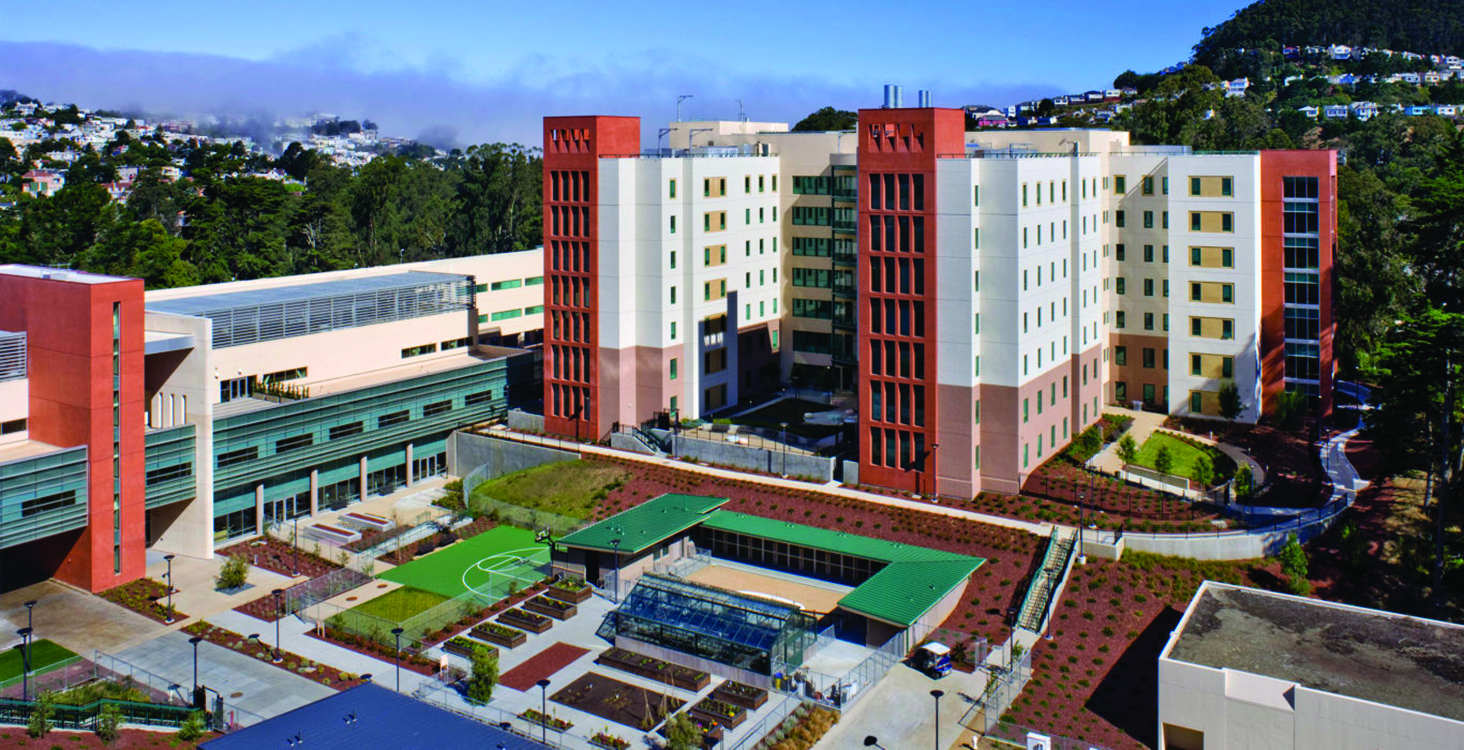
In April 2025, Laguna Honda Hospital & Rehabilitation Center received a five-star quality rating from the Centers for Medicare & Medicaid Services (CMS), the gold-standard badge of excellence in long term care. This would be a cause for celebration for any facility, but for Laguna Honda, a storied Bay Area institution founded more than 150 years ago, it marked a stunning redemption arc.
Just three years earlier, the hospital lost its Medicare and Medicaid certification after a series of damning inspections. What followed was an intensive, high-stakes effort that mobilized Laguna Honda’s massive workforce and community, ultimately concluding in the coveted five-star rating—and a 24-hour party.
‘A Shock to the System’
Laguna Honda lost its CMS certification in 2022 after regulators highlighted a range of safety concerns. Health officials stripped the hospital of its federal funding and announced that it would have to close entirely within four months. This was a devastating order: with approximately 700 patients, Laguna Honda represented more than 30 percent of San Francisco’s skilled nursing facility beds and primarily served low-income patients. Under the shutdown order, all of these patients—many with complex medical needs—would have to be transferred elsewhere.
For Laurie Clark, whose brother Billy has lived at Laguna Honda for 47 years, the news was traumatic, even surreal. “It was a shock to the system,” she recalled. “We knew it would be very hard to replace Laguna Honda, what it does, and what it’s capable of doing. It was stressful for all the families, not just ours.”
Indeed, a small number of the facility’s residents were negatively impacted by the moves, and regulators agreed to suspend the transfer process under pressure from local officials. This allowed Laguna Honda to continue providing care to residents in place as it undertook a herculean transformation process to meet the requirements for recertification.
A Thousand-Step Plan
That process began swiftly after CMS pulled Laguna Honda’s Medicare and Medicaid provider agreements. In one of the first moves, Roland Pickens, CEO of the San Francisco Health Network, stepped in as interim CEO. “We quickly needed to mobilize,” he said, “to really just get a game plan together.”
That mobilization began with an exhaustive root-cause analysis conducted by external experts. This led to the development of a comprehensive corrective-action plan with more than a thousand deliverables.
“It affected every individual in the institution,” Pickens said, noting that Laguna Honda has about 1,500 employees. “We had to do a lot of organizational management and culture change with all of our staff. That meant developing deeper partnerships, particularly with the unions who represent all of the staff—bringing them on board, having them a part of the planning and engagement.”
One major change was a renewed emphasis on in-person, hands-on training. “What we found was that computer-based training alone isn’t sufficient,” Pickens explained. “You’ve got to get people in a classroom setting where they have an opportunity to ask questions and get clarification.”
Staff, including leadership, went through full-day sessions on infection prevention, personal protective equipment (PPE) usage, and other critical-care protocols. “Every employee in the hospital, including myself, went through a day of infection prevention and control where we learned how to wash our hands appropriately,” Pickens recalled.
“We learned how to don and doff PPE, like gowns, goggles—all those things. It was an intense first twelve to sixteen months of just really engaging with staff who were doing all this additional education and retraining on top of their daily jobs, still taking care of the residents.”
An Organizational Overhaul
At the same time, Laguna Honda’s organizational structure was revised. One of the problems the leadership identified was because the institution was so large and it operates as a general acute care hospital, as well as a skilled nursing facility (SNF), it was structured more as the former than the latter. “One of the learnings from our consultants was that we needed to infuse more skilled nursing expertise into the operations,” Pickens said.
That meant bringing aboard Diltar Sidhu, a seasoned nursing home administrator, as CEO, plus two new directors of nursing with SNF experience.
“We continue to look at other efficiencies in the organizational structure to ensure that we stay efficient and align ourselves with the SNF industry,” Sidhu said, “so we can continue to improve and provide the quality of care that our residents deserve.”
Deep investment in Laguna Honda’s culture was essential to its success. Transparency and accountability are top priorities. Conducting town halls and regular surveys ensures that employees, residents, and family members all have the opportunity to hear from facility leaders and voice their concerns.
“We’re learning and listening to the staff and understanding what their challenges are so we can continue to support them,” Sidhu said. “All of these things combined over time are what really build trust and lead you toward a culture change.”

Another significant change was the placement of “huddle boards” across Laguna Honda’s thirteen nursing units, which effectively function as their own SNFs. These boards help monitor quality and improve performance by tracking important indicators, such as falls and pressure ulcers, for all to see.
“We brought that to the individual frontline staff in a way that they had not experienced previously,” Pickens said. “That’s become part of the culture now—continuous improvement at the unit level where the care is actually being performed.”
From Decertification to Recertification in Two Years
These efforts swiftly yielded results. In August 2023, state regulators approved Laguna Honda’s application to rejoin Medi-Cal, California’s Medicaid program, five days after its submission. Then, in June 2024—two years and over a thousand reforms after it was decertified—Laguna Honda had its Medicare certification approved by CMS.
It was a critical milestone for a facility that Speaker Emerita of the House of Representatives Nancy Pelosi described as “a pillar of the health and well-being for generations of San Francisco families.” As officials noted in a press release, 95 percent of Laguna Honda residents rely on Medicaid for their care, with the rest depending on Medicare.
Laguna Honda resumed admissions in the summer of 2024. Residents displaced before the pause on transfers were given the option to return, and several did.
Grant Colfax, the director of health for the City and County of San Francisco at the time, said in an official statement, “It is wonderful to have former Laguna Honda residents reenter our facility and reconnect with their former nurses, social workers, physicians, and care teams. It is testimony to the connection these residents have to Laguna Honda that after two years living elsewhere, they want to return and again call Laguna Honda home.”
‘A City within a City’
Finally, in April 2025 came the five-star designation from CMS, a massive leap from the two-star rating Laguna Honda held before the decertification and a sign that the facility’s staff had not only risen to the challenge, but exceeded it.
“There was a sense of satisfaction and a lot of joy,” Sidhu said. “Even when I came in, I didn’t know whether Laguna would succeed. But we all took a chance to invest in Laguna Honda, and I think there’s a sense of pride in the staff seeing that this is what they worked for.”
Staff celebrated with a 24-hour appreciation event that spanned all three shifts—complete with food, T-shirts, and banners with pictures of staff. “We celebrated with the staff and the families and residents. They stayed with us through this journey and supported this change,” Sidhu said.
According to Corey Egel, a spokesperson for the California Association of Health Facilities, Laguna Honda’s journey “is a testament to its commitment to excellence in patient care.”
“Regaining Medicaid certification is a very involved process that demands comprehensive corrective actions, proven compliance with federal and state regulations, and, often, significant cultural and operational changes within a facility,” Egel said. “CMS requires facilities to address immediate deficiencies and to implement systemic solutions to prevent future issues from occurring. Restoring a facility’s reputation post-decertification involves rebuilding trust with residents, families, staff, and the broader community.”
For Laurie Clark, who recalled the “absolute relief and elation” she felt upon learning of Laguna Honda’s recertification, what stands out about the journey is the resilience of everyone involved. In the 47 years her brother’s been a resident, she’s come to deeply appreciate the doctors, social workers, aides, kitchen workers, and custodial staff who hold the facility together—and keep her comfortably assured that Billy is in good hands.
“Laguna Honda is a city within a city,” she said. “It’s people’s livelihoods, and it’s all the care that they give. The level of respect and dignity they show the residents—that’s what makes it so special.”